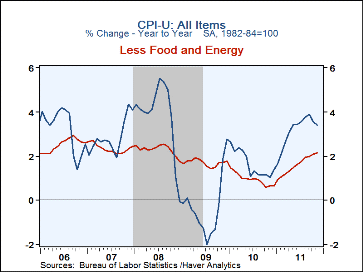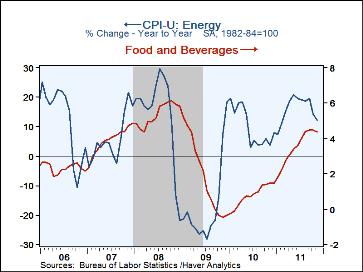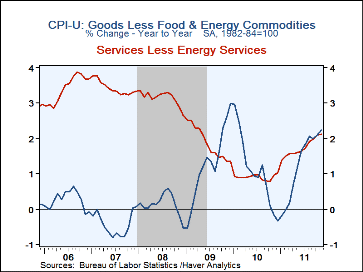 Global| Dec 16 2011
Global| Dec 16 2011U.S. CPI Slips As Energy Prices Decline; Core Picks Up
by:Tom Moeller
|in:Economy in Brief
Summary
There's still little pricing power in the U.S. economy. The November Consumer Price Index slipped marginally following a slight October decline. The decline compared with expectations for a 0.1% uptick. Consumer prices less food & [...]
 There's still little pricing power in the U.S. economy. The
November Consumer Price Index slipped marginally following a slight
October decline. The decline compared with expectations for a 0.1%
uptick. Consumer prices less food & energy were slightly firmer
and rose 0.2% following two consecutive 0.1% upticks. The gain was
firmer than expectations for a 0.1% uptick. Over several months,
price inflation still looks contained. On a three-month basis, the
CPI is up at a 0.8% annual rate and that's lower than its April peak
of 6.2%. Core inflation was 1.5% over the last three months, down as
well from its 3.1% July peak.
There's still little pricing power in the U.S. economy. The
November Consumer Price Index slipped marginally following a slight
October decline. The decline compared with expectations for a 0.1%
uptick. Consumer prices less food & energy were slightly firmer
and rose 0.2% following two consecutive 0.1% upticks. The gain was
firmer than expectations for a 0.1% uptick. Over several months,
price inflation still looks contained. On a three-month basis, the
CPI is up at a 0.8% annual rate and that's lower than its April peak
of 6.2%. Core inflation was 1.5% over the last three months, down as
well from its 3.1% July peak.
Energy prices led the CPI lower last month with a 1.6% decline (+12.4% y/y). Gasoline prices fell 2.4% (+19.7% y/y) following a 3.1% October drop. Fuel oil prices, however, rose a not seasonally adjusted 2.3% (19.7% y/y). Food & beverage prices rose 0.1% for the second consecutive month but the 4.4% y/y gain remained the strongest since early-2009. Strength continued in dairy products (8.7% y/y), meats (6.9% y/y) and cereal products (6.2% y/y).
For goods alone, core prices rose 0.1% after two months of decline. Apparel prices rose 0.6% (4.8% y/y) while motor vehicle prices fell 0.3% (+3.2% y/y). Household furnishings & operations prices were unchanged (0.8% y/y).
Core service prices rose 0.2% (2.1% y/y) for the fifth straight month. Education costs were strong and rose 0.5% (4.7% y/y) and medical care service prices also rose 0.5% (3.5% y/y). Shelter costs, which are 32% of the CPI, rose 0.2% but the y/y change held at 1.8% versus its 0.4% dip last year. Owners equivalent rent of primary residences, a measure not equivalent to other house price measures, edged up 0.1%. The 1.7% y/y increase is up from its lowest of no-change for all of last year. Public transportation prices rose 0.1% (5.3% y/y) while recreation costs also inched up 0.1% (0.3% y/y).
The chained CPI, which adjusts for shifts in consumption patterns, fell 0.1% (+3.2% y/y). Chained prices less food & energy was unchanged m/m (1.9% y/y).
The consumer price data is available in Haver's USECON database while detailed figures can be found in CPIDATA. The expectations figure is the AS1REPNA database.
| Consumer Price Index (%) | Nov | Oct | Sep | Nov Y/Y | 2010 | 2009 | 2008 |
|---|---|---|---|---|---|---|---|
| Total | -0.0 | -0.1 | 0.3 | 3.4 | 1.6 | -0.3 | 3.8 |
| Total less Food & Energy | 0.2 | 0.1 | 0.1 | 2.2 | 1.0 | 1.7 | 2.3 |
| Goods less Food & Energy | 0.1 | -0.1 | -0.2 | 2.2 | 1.1 | 1.3 | 0.1 |
| Services less Energy | 0.2 | 0.2 | 0.2 | 2.1 | 0.9 | 1.9 | 3.1 |
| Food & Beverages | 0.1 | 0.1 | 0.4 | 4.4 | 0.8 | 1.9 | 5.4 |
| Energy | -1.6 | -2.0 | 2.0 | 12.4 | 9.6 | -18.2 | 13.7 |
| Chained CPI: Total (NSA) | -0.1 | -0.2 | 0.1 | 3.2 | 1.5 | -0.1 | 3.7 |
| Total less Food & Energy | 0.0 | 0.2 | 0.2 | 1.9 | 0.7 | 1.5 | 2.0 |
Tom Moeller
AuthorMore in Author Profile »Prior to joining Haver Analytics in 2000, Mr. Moeller worked as the Economist at Chancellor Capital Management from 1985 to 1999. There, he developed comprehensive economic forecasts and interpreted economic data for equity and fixed income portfolio managers. Also at Chancellor, Mr. Moeller worked as an equity analyst and was responsible for researching and rating companies in the economically sensitive automobile and housing industries for investment in Chancellor’s equity portfolio. Prior to joining Chancellor, Mr. Moeller was an Economist at Citibank from 1979 to 1984. He also analyzed pricing behavior in the metals industry for the Council on Wage and Price Stability in Washington, D.C. In 1999, Mr. Moeller received the award for most accurate forecast from the Forecasters' Club of New York. From 1990 to 1992 he was President of the New York Association for Business Economists. Mr. Moeller earned an M.B.A. in Finance from Fordham University, where he graduated in 1987. He holds a Bachelor of Arts in Economics from George Washington University.
More Economy in Brief
 Global| Feb 05 2026
Global| Feb 05 2026Charts of the Week: Balanced Policy, Resilient Data and AI Narratives
by:Andrew Cates








